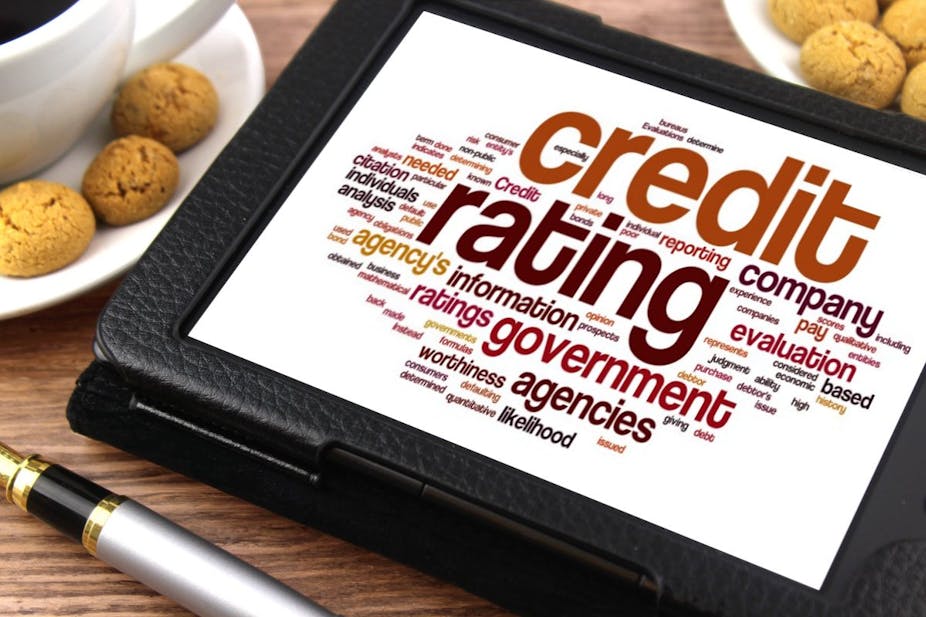The credit rating industry in Africa is dominated by the three international agencies: Moody’s, S&P and Fitch. Together they control an estimated 95% of the credit rating business globally.
Credit rating agencies are institutions that assess a borrower’s creditworthiness in general terms, or with respect to a particular debt or financial obligation. A credit rating can be assigned to any entity that seeks to borrow money – an individual, a corporation, a state or provincial authority, or a sovereign government. Investors use a credit rating to make decisions about risk and return. So the rating is required if an institution wants to raise funds on financial markets.
South Africa was the first African country to receive a sovereign rating, in 1994. To date, 32 African countries have received a sovereign rating from at least one of the “big three” agencies.
But policy makers are increasingly dissatisfied with their approach and methodology. Some of the criticisms are that agencies are quick to downgrade African countries but slow when upgrades are due; that they fail to accurately account for risk perception; that they don’t consult adequately with stakeholders; and that they lack independence and objectivity.
A recent study by the UN showed that subjective biases in credit ratings had cost African countries a combined US$74.5 billion. This was through funding opportunities lost and excess interest paid on public debt.
Conditions are therefore ripe to advance the idea of establishing an African credit rating agency as a partial solution. China has its own state-owned rating agency, Dagong Global Credit Rating Company. The Arab countries are also calling for their own rating agency.
As a lead expert with the African Union on ratings agencies, I can explain the framework this agency would operate in and why it makes business sense.
African Union official decisions
In March 2019, African Union (AU) ministers of finance and economy officially adopted a declaration that such an institution was needed. The AU also developed a proposal for the legal, financial and structural aspects of the rating agency. What’s not yet agreed is how the sustainability, credibility and independence of the agency will be achieved. But there is a way this could be achieved as I set out below.
The need for an African Rating agency has been reiterated by the current Chair of the AU, President Macky Sall of Senegal, and the Champion of the AU financial institutions, President Nana Akufo-Addo of Ghana. They highlighted it as an important step towards intra-continental integration. It would also enable AU member states to access capital and integrate the continent with global financial markets.
Institutional model
When the AU establishes a new institution, it can be either:
an organ of the union funded by its member states’ contributions, or
a self-funded autonomous specialised agency of the union.
Because the credit rating business requires credibility and independence, the best option is the specialised agency. Examples already in operation are the African Export-Import Bank and Africa Risk Capacity agency.
As an independent specialised agency of the AU, the agency would have diverse classes of shareholders. African governments could own it either directly or through their designated public institutions. Shareholding could include other smaller African-owned rating agencies, multilateral finance institutions and African national financial institutions.
As a financing structure, the agency would adopt the “issuer-pay” business model. The issuers of debt will pay the agency for rating its entity and products.
It would be fully funded by its shareholders and through loans from pan-African financial institutions. Multilateral development banks would either encourage or make it mandatory for their clients to have a rating from the African rating agency. Once this is done it should be able to sustain itself through revenue generated from its services.
As is the process in the AU, the African rating agency would be established through an agreement, signed by at least 10 member states.
The business case
There are still 22 African countries that have no credit ratings from the “big three” agencies. This will be a clear niche for the AU rating agency.
There is also tremendous value in the alternative rating sector, which cannot afford the cost of maintaining a rating from the “big three”. This includes small to medium enterprises, initial bond offerings and initial public offerings. The agency could also provide environmental, social and governance scores and foreign direct investment ratings. These rating services are urgently needed on the continent to complement governments’ efforts to support the development of domestic financial markets.
With the backing that comes from affiliation to the AU, the rating agency could secure substantial business in the ratings of domestic instruments that are aligned with the continent’s goals.
It would have the advantage of understanding the domestic context of Africa. So it could issue more informative and detailed ratings than those issued by the “big three”.
Way forward
The African Union is forging ahead with its plans to establish an African rating agency to complement the three dominant international agencies, and support the development of domestic financial markets in Africa. Although it will have to overcome challenges to gain investors’ support, there is a huge appetite for an alternative and complementary credit rating institution in Africa. Its success will be in developing a comprehensive methodology adapted to the African context, and resident analysts that understand the continent’s dynamics.

